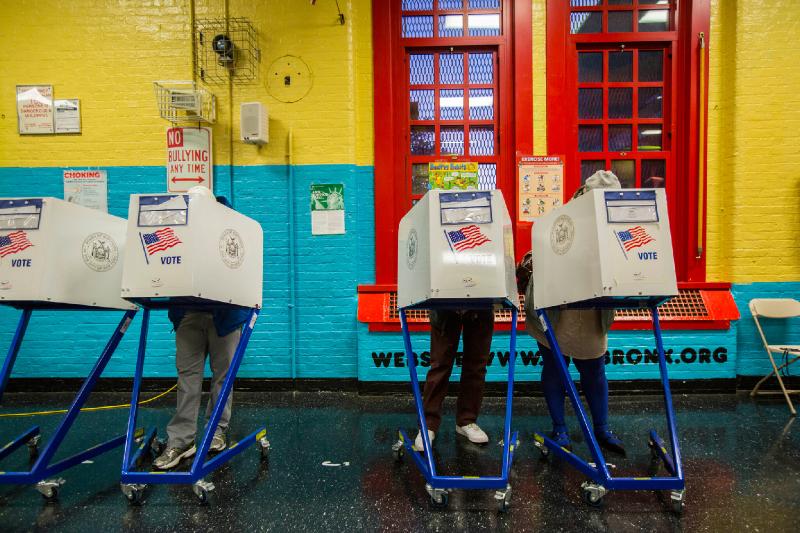Online Troll Named Microchip Tells of Sowing ‘Chaos’ in 2016 Election



The two social media influencers teamed up online years ago.
Both had large right-wing followings and pseudonyms to hide their real identities. One called himself Ricky Vaughn, after a fictional baseball player portrayed in a movie by Charlie Sheen. The other called himself Microchip.
In 2016, prosecutors say, they set out to trick supporters of Hillary Clinton into thinking they could vote by text message or social media, discouraging them from the polls.
“Ricky Vaughn,” whose real name is Douglass Mackey, was charged in 2021 with conspiring to deprive others of their right to vote, and on Wednesday the men met face to face in court for the first time.
Mr. Mackey sat at the defense table in Federal District Court in Brooklyn wearing a sober gray suit. He watched as Microchip, clad in a royal-blue sweatsuit and black sandals, approached the witness stand, where he was sworn in under that name and began testifying against him.
This month, a federal judge overseeing the case, Nicholas G. Garaufis, ruled that Microchip could testify without revealing his actual name after prosecutors said anonymity was needed to protect current and future investigations.
The sight of a witness testifying under a fictional identity added one more odd element to an already unusual case that reflects both the rise of social media as a force in politics and the emergence of malicious online mischief-makers — trolls — as influential players in a presidential election. This week’s trial could help determine how much protection the First Amendment gives people who spread disinformation.
Microchip’s testimony appeared intended to give jurors an inside view of what prosecutors describe as a conspiracy to disenfranchise voters. It also provided a firsthand account of crass, nihilistic motives behind those efforts.
“I wanted to infect everything,” Microchip said, adding that his aim before the 2016 election had been “to cause as much chaos as possible” and diminish Mrs. Clinton’s chances of beating Donald J. Trump.
Evidence presented by prosecutors has shown how Mr. Mackey and others, including Microchip, had private online discussions in the weeks before the election, discussing how they could move votes.
While Mr. Mackey made clear that he wanted to help Mr. Trump become president, Microchip testified that he was driven mainly by animus for Mrs. Clinton, testifying that his aim had been to “destroy” her reputation.
In the fervid and fluid environment surrounding the 2016 election, Mr. Mackey, whose lawyer described him as “a staunch political conservative,” and Microchip, who told BuzzFeed that he was a “staunch liberal,” became allies.
Online exchanges and Twitter messages entered into evidence by prosecutors showed the men plotting their strategy. Mr. Mackey saw limiting Black turnout as a key to helping Mr. Trump. Prosecutors said that he posted an image showing a Black woman near a sign reading “African Americans for Hillary” and the message that people could vote by texting “Hillary” to a specific number.
Microchip testified that Mr. Mackey was a participant in a private Twitter chat group called “War Room,” adding that he was “very well respected back then” and “a leader of sorts.”
Prosecutors introduced records showing that Microchip and Mr. Mackey had retweeted one another dozens of times.
Mr. Mackey’s particular talent, according to Microchip, was coming up with ideas and memes that resonated with people who felt that American society was declining and that the West was struggling.
Microchip testified that he was self employed as a mobile app developer. He said he had pleaded guilty to a conspiracy charge related to his circulation of memes providing misinformation about how to vote. Because of his anonymity the details of that plea could not be confirmed. And he added that he had signed a cooperation agreement with prosecutors agreeing to testify against Mr. Mackey, and to help with other cases.
Under cross-examination, Microchip said he had begun working with the F.B.I. in 2018. He also acknowledged telling an investigator in 2021 that there was no “grand plan around stopping people from voting.”
His time on the stand included a tutorial of sorts on how he had amassed Twitter followers and misled people who viewed his messages.
He testified that he had built up a following with bots, and used hashtags employed by Mrs. Clinton in a process he called “hijacking” to get his messages to her followers. He aimed to seduce viewers with humor, saying, “When people are laughing, they are very easily manipulated.”
Microchip said that he sought to discourage voting among Clinton supporters “through fear tactics,” offering conspiratorial takes on ordinary events as a way to drive paranoia and disaffection.
One example he cited involved the emails of John Podesta, Mrs. Clinton’s campaign chairman, which were made public by WikiLeaks during the campaign.
There was nothing particularly surprising or sinister among those emails, Microchip said, yet he posted thousands of messages about them suggesting otherwise. “My talent is to make things weird and strange, so there is controversy.”
Asked by a prosecutor whether he believed the messages he posted, Microchip did not hesitate.
“No,” he said. “And I didn’t care.”









Recent advances in software will undoubtedly make 2016 shenanigans look like tech dinosaurs in 2024.
---------------------------------------------------
“People demand freedom of speech as a compensation for the freedom of thought which they seldom use.”
Søren Kierkegaard